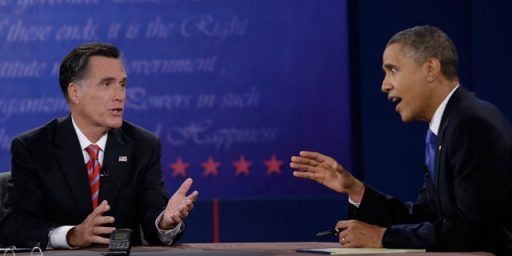Wealthy Voters Shift Blue
Daniel Gross reports:
… the poll for the House vote in the East showed that the 25 percent of the electorate making over $100,000 went big for Democrats overall, 57-42, compared with a 49-48 margin in 2004. In 2006, those making between $150,000 and $200,000 voted for Democratic candidates by a whopping 63-37 majority, and those making more than $200,000 went Democratic by a slim 50-48 margin. That’s a huge shift from 2004, when Republicans took the $150,000 to $200,000 demographic 50-48 and rang up a huge victory among the over $200,000 set: 56-40. In 2006, Democratic candidates racked up big wins among college graduates—63-35, compared with 55-42 in 2004—and among those with postgraduate degrees—68-31, compared with 58-38 in 2004. …
On a nationwide basis, the wealthy still vote Republican. But not by much. According to the 2006 exit poll, on a nationwide basis, of all homes making more than $100,000, Republican House candidates received a 51-47 majority, and among those making more than $200,000, Republicans racked up a 53-46 majority.
Are these voters behaving irrationally? Gross opines:
As the number and relative weight of the wealthy grow, their incomes rising in part because Republicans have cut taxes on their incomes and capital gains, they’re proving themselves less likely to vote their economic interests.
Actually, I suspect that the blue-shifted voters figured they could have their cake and eat it too. With Bush in the White House to veto any tax increases and the Democrats having promised AMT reform, these voters’ economic interests were safe. (To be sure, there’s a modest risk that the Democrats will allow the Bush tax cuts to expire when the sunset provisions begin kicking in a few years down the road, but voters probably gambled that the Democrats will renew most of the key cuts.) With their economic interests secure, they were free to vote based on the war or stem cells or what have you.
The more interesting test will be in 2008, when there will be a real prospect of unified Democrat government, which could more significantly threaten the economic interests of upper middle and upper class voters. If they shift back to the red at the Presidential level, we’ll know that they are economically rational after all.






A good illustration of why economics is just economics, and not the Master Science.
What’s the average voter’s “economic interest” in a sensible foreign policy? In the prohibtion of torture? In the suspension of habeas for noncitizens?
Is a voter who lets such considerations sway his vote “irrational”?
A couple of other thoughts.
1. Many of the blue rich are lawyers, consultants, university administrators, and government contractors. They all economically benefit from the Democrats being in control.
2. Being Democratic is seen as being hip. Look at the percentage of selective university students who are Democrats. The same goes for their parents. It would probably harder for a child to come out as a Republican than coming out as gay to any parents living in Manhattan.
3.More rich minorities such as the Asian community.
4. Urban centers are overwhelmingly blue. The only way anyone in NYC, LA, SF, DC, Boston can be involved in politics is by being involved in Democratic politics.
Just more signs that the Republicans are a party in decline and have no where to turn to gain additional support.
I do not understand why you assume it is to a wealthy persons self interest to vote republican.
If you look at the record since WW II real GDP growth has averaged some 4% under democrats but only 3.8% under republicans — it use to be 3% but Bush pulled the average down.
From WW II until George Bush took office the average annual total return of the S&P 500 was 15.7% under Democrats and 10.6% under Republicans. Of course if you had gone into cash in January 2001 when Bush took office your portfolio would now be up 15.4% versus 11.2% for the S&P 500 with daily dividend reinvestment.
So even though I have not done the numbers Bush will also pull this republican average down.
The recent more rapid growth in income of the top 1% of the income spectrum would argue in favor of voting Republican, but over the long run the after tax income of the top 20% of the income spectrum was the same under democrats and republicans — it is much better for all other income groups under democrats. Moreover, the top 1% of income was growing more rapidly in the 1990s so it does not appear to be a product of republican policy.
Even the old small business fear of democrats imposing more regulations has proven incorrect. I’m sure you remember the old Milton Freedman op-ed in the WSJ about using the number of pages in the federal registry as a measure of the federal government interfering with the economy and limiting freedom. Under Bush the number of pages in the Federal Resister has averaged 4.5% more then it did under Clinton.
I’ve never found any significant economic measure that has performed better under Republican then Democrats but I’m sure you can show me some to demonstrate why it is to anyone’s self interest to vote republican.
It has more to do with education. People with higher levels of education tend to vote more Democratic and they also tend to earn more.
The urban issue is also at play. The centers of finance, economic development, culture, and innovation are all in urban places where the closed-mindedness and irrational decisionmaking that has marked Bush and the Republicans’ performance is considered highly problematic.
The places where Republicans tend to do well are in areas of the country with lower-middle class incomes and higher levels of church attendance–indicative of lower appreciation for rationality.
I don’t believe voters looked at anything beyond who was running in their particular district and what that candidate’s positions were. All politics is local and the voters looked only as far their own ballot. If the Dem candidate campaigned on issues that mattered to you he could get your vote but very few voters looked at how that would fit into the big picture in Washington.
I doubt any Dems ran on promises to raise taxes or increase regulations. More likely they ran against the way the war is being handled and corruption in Washington. Those were the issues before the voters with other concerns left behind. Even if Republicans brought up the spectre of Democratic tax and spend policies it seemed more like negative campaigning (not to mention the dismal record of Republicans on spending).
We shouldn’t give voters that much credit to assume they would even know how to vote their economic interests. Sad but true.
Actually, I suspect that the blue-shifted voters figured they could have their cake and eat it too.
A lot of us have been democratic all along. And we know precisely where our economic interests lie. We understand perfectly well that there isn’t any such thing as the free lunch y’all keep pushing in the form of supply side economics and that eventually it’s our children who have to pay the credit tab y’all keep running up whenever you get into office.
Triumph,
The urban areas are also where most government employees and contractors working for the government live. No surprise that they vote for those who promise to expand their career opportunities by expanding government.
Would it not be rational to expect that the impulse to vote strictly on one’s personal financial interest might fade in proportion to one’s own financial security? Many wealthy people are well educated, and understand that their long term financial security is best assured with a robust healthy economy in which others propser as well. Plus, having financial security for oneself allows the luxury of considering the larger picture, and the general welfare of one’s society.
Actually I suspect they were just sick of Iraq and corruption. Just like they said they were.
I am not sure about the veracity of this. There are only 2.6 million Federal governmental employed nation-wide. Outside of the District of Columbia–which didn’t figure into last week’s election–the state that has the highest number of federal employees per capita is Alaska–probably one of the most consistently Republican states, and least urban, in the union.
I suppose it depends on how you define “wealthy”. The high net worth folks I know who are basically so wealthy they don’t have to worry about money think the Bush tax cuts are great.
Most of the working professionals I know, say with incomes in the 150-250k range are not so enamored with Bush or his tax cuts.
An income of 150k is certainly not “wealthy” here in the Bay Area. When you look at surging costs for energy, health care, telecom, etc. under Bush… well I would go back to the days of the Clinton economy with pleasure.
I don’t believe voters looked at anything beyond who was running in their particular district and what that candidate’s positions were.
And that’s why Chafee lost?
Lip service, pure and simple. The GOP platform is all about capitalism, small/non-interfering/business-friendly gov’t, lower taxes, free trade, etc. That stuff sounds great at a fundraiser. But it wasn’t actually happening in reality (cursed reality! it hates America!), so even a lot of usually-safe Repub supporters stopped buying the BS.
.
While I am a big proponent of this philosophy, I have also heard a surprising number of anectdotal “I’ve never voted straight Dem before” stories, both in the news & from friends (including my wife!) – I’m not so sure that rule applies in this particular election.
Agreed, from my earlier statement on lip service – voters like what they hear, but rarely ever connect campaign promises to actions…
Chafee lost in Rhode Island not because of voter attitudes in Oregon, Texas, or anywhere else. His opponent beat him in the eyes of R.I. voters. In my opinion Chafee was neither Republican or Democrat and that cost him.
The point is each individual race must be analyzed to determine why they turned out as they did. To claim results in individual districts were part of an overall mood is convenient but not accurate.
Weak Republican candidates hurt as much as anything else. Sorry, weak Republican candidates and strong Democratic candidates with centrist positions. This was not a monumental swing in the country’s mood but a slight shift that yielded great benefits for the Democratic party.
Steve’s assignment for next week – which stimulates the economy more, $5 million given to some heiress with $500 million in an offshore stash already or $5 given to a million of the nation’s poorest so they can spend it at the local store?
Those who are “economically rational” realize it may be better to let the government take a few percentage points of a bigger pie than have the whole of a smaller pie to themselves. That way, the folks at the bottom of the heap get some assistance with their costs of living and the money flows uphill generating a cascade of economic activity as it does so. Welcome to Gordon Brown’s ethical economics.
Regards, Cernig
Cernig,
Let’s throw in one more option for Prof. Bainbridge’s homework.
Give $5 million to small businesses for investment in capital equipment creating jobs and stimulating other sectors of the economy. Heck, give those jobs to very same poor people already mentioned.
It’s good to remember not all tax cuts go to heiresses worth $500 million.
Steven,
Agreed. The top 10% got one hel of a lot more than 10% of the actual cash from Bush’s tax breaks. It would be nice if such breaks could be tailored to where they would actually do most good, wouldn’t it?
Regards, C